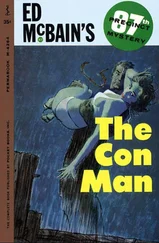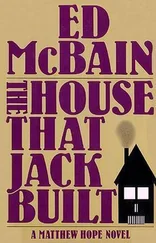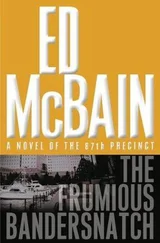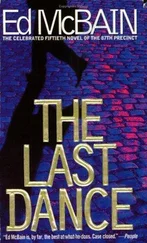Ed Mcbain - The Heckler
Здесь есть возможность читать онлайн «Ed Mcbain - The Heckler» весь текст электронной книги совершенно бесплатно (целиком полную версию без сокращений). В некоторых случаях можно слушать аудио, скачать через торрент в формате fb2 и присутствует краткое содержание. Жанр: Полицейский детектив, на английском языке. Описание произведения, (предисловие) а так же отзывы посетителей доступны на портале библиотеки ЛибКат.
- Название:The Heckler
- Автор:
- Жанр:
- Год:неизвестен
- ISBN:нет данных
- Рейтинг книги:4 / 5. Голосов: 1
-
Избранное:Добавить в избранное
- Отзывы:
-
Ваша оценка:
- 80
- 1
- 2
- 3
- 4
- 5
The Heckler: краткое содержание, описание и аннотация
Предлагаем к чтению аннотацию, описание, краткое содержание или предисловие (зависит от того, что написал сам автор книги «The Heckler»). Если вы не нашли необходимую информацию о книге — напишите в комментариях, мы постараемся отыскать её.
The Heckler — читать онлайн бесплатно полную книгу (весь текст) целиком
Ниже представлен текст книги, разбитый по страницам. Система сохранения места последней прочитанной страницы, позволяет с удобством читать онлайн бесплатно книгу «The Heckler», без необходимости каждый раз заново искать на чём Вы остановились. Поставьте закладку, и сможете в любой момент перейти на страницу, на которой закончили чтение.
Интервал:
Закладка:
“Oh. Okay. When are you going to trip it?”
“As soon as I hang up.”
“All right. Will you call me back?”
“I will.”
“Right.”
Mr. Gannley hung up, walked to one of the alarm buttons set behind the tellers’ cages, and deliberately stepped on it. The alarm went off with a terrible clanging. Immediately, Mr. Gannley turned it off, and then called the police again to tell them everything was working fine. He passed the vault door and patted it lovingly. He knew the alarm was there and working, a vigilant watchdog over all that money.
He did not know that its voice was a tribute to the careful labor which had gone on below the ground for the past two months, or that it would be silenced forever within the next half-hour.
IT WAS 5:05P.M.
In the new drugstore across the street from the bank, Rafe sat on a stool and watched the bank doors. Twelve people had left so far, the bank guard opening the door for each person who left, and then closing it again behind them. There were three people left inside the bank, including the bank guard. Come on, Rafe thought, get the hell out.
The big clock over the counter read 5:06.
Rafe sipped at his Coke and watched the bank doors.
5:07.
Come on, he thought. We have to catch a goddam ferry at five minutes after six. That gives us less than an hour. He figures we’ll be able to break away that remaining concrete in ten minutes, but I figure at least fifteen. And then ten more minutes to load the money, and another ten—if we don’t hit traffic—to get to the ferry slip. That’s thirty-five minutes, provided everything goes all right, provided we don’t get stopped for anything.
Rafe took off his gold-rimmed glasses, wiped the bridge of his nose, and then put the glasses on again.
The absolute limit, I would say, is five-forty-five. We’ve got to be out of that vault by five-forty-five. That gives us twenty minutes to get to the ferry slip. We should make it in twenty minutes. Provided everything goes all right.
We should make it.
Unreasonably, the bridge of Rafe’s nose was soaked with sweat again. He took off his glasses, wiped away the sweat, and almost missed the bank door across the street opening. A girl in a white blouse stepped out and then shrank back from the drizzle. A portly guy in a dark suit stepped into the rain and quickly opened a big black umbrella. The girl took his arm and they went running off up the street together.
One more to go, Rafe thought.
The bridge of his nose was sweating again, but he did not take off the glasses.
Across the street, he saw the bank lights going out.
His heart lurched.
One by one, the lights behind the windows went dark. He waited. He was getting off the stool when he saw the door opening, saw the bank guard step out and slam the door behind him. The guard turned and tried the automatically locked door. The door did not yield. Even from across the street, Rafe saw the bank guard give a satisfied nod before he started off into the rain.
The clock over the drugstore counter read 5:15. Rafe started for the door quickly.
“Hey!”
He stopped short. An icy fist had clamped onto the base of his spine.
“Ain’t you gonna pay for your Coke?” the soda jerk asked.
THE DEAF MANwas waiting at the far end of the tunnel, directly below the bank vault when he heard Rafe enter at the other end. The tunnel was dripping moisture from its walls and roof, and the deaf man felt clammy with perspiration. He did not like the smell of the earth. It was a suffocating, fetid stench which filled the nostrils and made a man feel as if he were being choked. He waited while Rafe approached.
“Well?” he asked.
“They’re all out,” Rafe said.
The deaf man nodded curtly. “There’s the box,” he said, and he swung his hand flash up to illuminate the box containing the wiring for the alarm system.
Rafe crawled into the gaping hole in the corroded steel bars and reached up for the exposed alarm box. He pulled back his hands and took off his glasses. They were fogged with the tunnel’s moisture. He wiped the glasses, put them back on the bridge of his nose, and then got to work.
IN THE FEVERED DELIRIUMof his black world, things seemed clearer to Steve Carella than they ever had in his life.
He sat at a nucleus of pain and confusion, and yet things were crystal clear, and the absolute clarity astonished him because it seemed his sudden perception threatened his entire concept of himself as a cop. He was staring wide-eyed at the knowledge that he and his colleagues had come up against a type of planning and execution which had rendered them virtually helpless. He had a clear and startling vision of himself and the 87th Squad as a group of half-wits stumbling around in a fog of laboratory reports, fruitless leg work, and meaningless paper work which in the end brought only partial and minuscule results.
He was certain now that John Smith had been murdered by the same deaf man who had shot and repeatedly battered Carella with the stock of a shotgun. He was reasonably certain that the same weapon had been used in both attacks. He was certain, too, that the blueprint he’d found in the Franklin Street apartment was a construction blueprint for the vault of the Mercantile Trust, and that a robbery of that vault had been planned.
Intuitively, and this was what frightened him, he knew that the murder, and his own beating, and the planned bank robbery were tied in to the case Meyer Meyer was handling, the so-called Heckler Case.
He did not question the intuition nor its clarity—but he knew damn well it scared him. Perhaps it would have frightened him less if he’d known it wasn’t quite intuition. Whether he realized it or not, and despite the fact that he had never openly discussed the supposedly separate cases with Meyer, he had unconsciously been exposed to siftings of telephone conversations, to quick glances at reports on Meyer’s desk. These never seemed to warrant a closer conversation with the other detective, but they did nonetheless form a submerged layer of knowledge which, when combined with the knowledge he now possessed, welded an undeniable and seemingly intuitive link.
But if the reasoning were correct—and it could hardly be called reasoning—if this sense of connection were accurate, it pointed to someone who was not gambling senselessly against the police. Instead, it presented the image of a person who was indeed leaving very little to chance, a person who was using the agencies of law enforcement, utilizing them as a part of his plan, making them work for him, joining them instead of fighting them, making them an integral part of a plan which had begun—how long ago?
And this is what frightened Carella.
Because he knew, detective fiction to the contrary, that the criminal mind was not a particularly brilliant one. The average thief with whom the squad dealt daily was of only average intelligence, if that, and was usually handicapped by a severe emotional disturbance which had led him into criminal activities to begin with. The average murderer was a man who killed on the spur of the moment, whether for revenge, or through instant rage, or through a combination of circumstances which led to murder as the only seemingly logical conclusion. Oh yes, there were carefully planned robberies, but these were few and far between. The average job could be cased in a few days and executed in a half hour. And yes, there were carefully planned murders, homicides figured to the most minute detail and executed with painstaking precision—but these, too, were exceptions. And, of course, one shouldn’t forget the confidence men whose stock in trade was guile and wile—but how many new con games were there, and how many con men were practicing the same tired routines, all known to the police for years and years?
Читать дальшеИнтервал:
Закладка:
Похожие книги на «The Heckler»
Представляем Вашему вниманию похожие книги на «The Heckler» списком для выбора. Мы отобрали схожую по названию и смыслу литературу в надежде предоставить читателям больше вариантов отыскать новые, интересные, ещё непрочитанные произведения.
Обсуждение, отзывы о книге «The Heckler» и просто собственные мнения читателей. Оставьте ваши комментарии, напишите, что Вы думаете о произведении, его смысле или главных героях. Укажите что конкретно понравилось, а что нет, и почему Вы так считаете.












